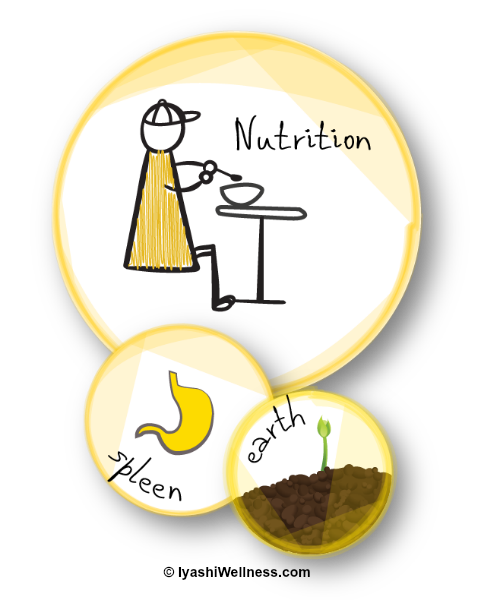This is Pillar Three in our original series. Read the introduction here: 6 Pillars + Magic Stardust: The Secrets to a Wholesome, Happy, Healthy Child. Read about Pillar One, the Wood Pillar, here. Read about Pillar Two, the Fire Pillar, here.
Today, we are discussing Pillar Three, the Earth Pillar.
Three fundamental things all human beings must do consciously to stay alive are: sleep, eat and poop. (Breathing is of course another, but that’s something we do unconsciously. I will cover breathing in the Metal Pillar. Sleep is partially conscious–the act of going to sleep is conscious, but sleep itself is beyond our control. I’ll cover the importance of sleep in the Water Pillar.) Of the 3 vital actions we must take to live, two fall under the Earth Pillar in Asian Medicine: Eating and Pooping.
Eating is the most time-consuming of the 3 actions. Not only is there the act of eating–literally masticating the food into swallowable bites, but there is everything else that surrounds eating: planning meals, buying groceries, chopping up and marinating ingredients, cooking, serving, sitting down to eat, clearing up the dishes, washing the dishes, and putting them all away. And the cycle starts all over again for every meal. For adults, most of us will eat–especially our lunches–in a rush, on the go, at the desk, or as an afterthought–long after hunger has struck–or not at all! Breakfast often mimics this similar pattern of rushing it, skipping it, or just doing coffee while we run out the door to work or to take our kids to school.
Imagine then, the food culture we have created for our children. Our children watch us rushing and not even eating our own meals. Then we expect our children to eat, and to eat healthily at that! As a consequence of both parents needing to work today, the time spent cooking at home has dramatically decreased, leading steadily to the rise in the last century of processed foods, ready-made meals, and eating out. I am sure it is not just me who has noticed that, compared to 10 years ago, grocery stores of today have allocated a much larger portion of their square footage to ready-made meals. If you walk into Whole Foods, they even have restaurants within the grocery store.
How has this affected the eating culture and eating habits of our children today? Well, there are numerous articles written on the state of the food culture in children (an excellent one is here). I also wrote an 8-Part series called Healthy, Happy Eating for the Whole Family, discussing the Standard American Diet, i.e. S.A.D diet, and how to stop your child from being a “picky” eater. (I also wrote a series on the Leaky Gut syndrome and how to heal it.) But let’s be kind to ourselves as parents, as what we eat and what we crave are often out of our control.
The important thing to remember is this simple belief in our children: Expect More. I don’t mean “expect more” in the authoritarian way, but “expect more” in the “I Believe You Can” way. Know that you as a parent have massive control in the beginning years to shape your child’s palate. It’s not too late for parents of older children, either. It may take some serious family talking, some tears, support from your spouse, clearing out the pantry and replacing junk food with more healthy options, and being firm with your convictions, but children are highly malleable. Staying consistent is key and role modeling is important. Healthy eating not only benefits the child’s long-term emotional and physical development and health, but if adopted by the whole family, it tremendously benefits the entire family’s emotional and physical well-being in the long run.
Expect your child to be able to eat that kale, or that brussels sprout, or that sardine, or that sauerkraut. Hold Space for her to be able to eat that vegetable today, tomorrow, or one day in the future. Always remember that she may not eat it today, but if you keep offering it in different presentations and banish other enticing junk food options in the house, these actions will lead to the eventual first bite, second bite, third bite until ultimately she will tolerate it–or even like it! So hold that space of Belief In Her that one day she will be eating a healthy food item and help manifest that with your commitment to your child’s ability to eat new foods.
To entice children to try new things, encourage them to shop with you at the farmer’s market or super market, prep the foods with you, and even help you cook. To remove the stress that often comes with food struggles, try introducing new foods at a restaurant where the air is a little more fun, you’re not stressed while cooking the food, and parents and children can enjoy each other’s company. Find families that eat like you’d like your child to eat, and have meals with them so that your child can watch his friend eating a plate of stir-fried veggies with meat, or drinking miso soup or eating a filet of salmon. As we know, peer pressure is powerful. Use it to your advantage.
Encouraging your child to eat healthy is not only good for their health, but for their academic success (Metal Pillar), social interactions (Fire Pillar), ability to get a good night’s sleep (Water Pillar), and sports performance (Wood Pillar). It is literally at the core of everything we CAN do, and affects every aspect of our lives. Core strengths — both muscles and digestive abilities — equates to better posture and proper musculoskeletal development as well.
Though not spoken often in these terms, core strength also includes the ability of the digestive system to properly defecate daily. Constipation is a massive problem in babies and children (as well as adults). I cannot count how many babies and children I have treated who are on laxatives. And even with laxatives, many of these children are still suffering. Poor core muscles, improper flow of qi in the channels, and inappropriate diets are the main culprits in infants and children who suffer from constipation. When there aren’t proper daily bowel movements, the child’s body is unable to get rid of toxins, backlogging the system and preventing natural hunger pangs. This leads to a form of malnutrition and picky eating. Even as adults, if we’re constipated, we often don’t have a healthy appetite. The same is true for a child or a baby.
I will say here–contrary to popular belief–even breastfed babies should be pooping every day, and they can poop every day. It is only because so many breastfed babies are NOT having proper bowel movements every day that this has become “normal” in our society, but physiologically, it is NOT normal. If anything, breastfed babies should be pooping more frequently than formula-fed babies because they are drinking their own mother’s milk–the most natural food a baby can have–and therefore, easiest to digest and break down. Yes, it is true that breastfed babies can more effectively digest and absorb breast milk better than formula-fed babies and therefore have smaller quantities of poop, but byproduct is byproduct, even from breast milk, and that needs to be removed from the body. The difference between breastfed babies’ and formula-fed babies’ poops are in the quantity, smell and color. Every baby, breastfed or formula-fed, should be pooping daily. I have countless times helped turn around babies to having daily–even multiple times a day–bowel movements, helping them get off prunes and other laxatives.
In the Five Element philosophy of Asian Medicine, we also attribute specific flavors to each element. Sour is for Wood, Bitter is for Fire, Sweet is for Earth, Pungent is for Metal and Salty is for Water. By teaching your child to appreciate all 5 flavors, you are also helping your child fully develop and regulate each of the organ systems and the Pillars (and will improve bowel regularity). American children tend to eat only sweet and salty flavors, which are the staple flavors of a SAD diet. Help them expand by introducing sour, bitter and pungent flavors.
From an Asian Medicine perspective, there is much we can do to support a child’s healthy gut, strong core and successful school performance — socially and academically. It is one of Asian Medicine’s tenets that to have a sharp and clear mind, one needs a healthy, well-functioning stomach and bowels. Just as eating is an act of taking in food, absorbing the nutrients, nourishing our bodies, and removing unwanted by-products, studying is similar in concept. One is taking in new information, absorbing it into the memory and putting it to use for daily cognitive needs and forgetting what one finds useless (or can I say too difficult to grasp initially!). Both eating and learning require repetition and muscle building–gut and brain muscle. Asian Medicine has long understood what Western Science is just catching up on today: the dynamic connection between the gut and brain, and that one begets the other. We have specific treatment protocols to strengthen the gut and brain connection.
As much as exercise, human connections, sleep and education are important in the healthy development of children, at the core is healthy nutrition and an optimally-functioning digestive system. Investing in healthy meals and ensuring proper bowel movements are worth the time, money and effort to raise children who will be healthy, resilient, happy and productive citizens.
If you missed them, read the introduction to this series here: 6 Pillars + Magic Stardust: The Secrets to a Wholesome, Happy, Healthy Child. Read about Pillar One, the Wood Pillar, here. Read about Pillar Two, the Fire Pillar, here.

